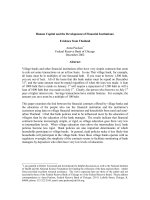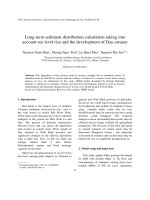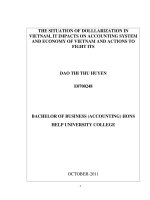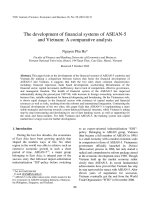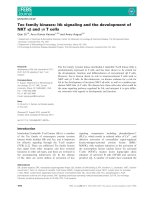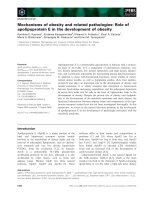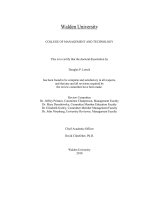Due process and the development of financial accounting standards An exploration of comment letters and their influence on financial accounting standards
Bạn đang xem bản rút gọn của tài liệu. Xem và tải ngay bản đầy đủ của tài liệu tại đây (2.89 MB, 168 trang )
Walden University
COLLEGE OF MANAGEMENT AND TECHNOLOGY
This is to certify that the doctoral dissertation by
Douglas P. Letsch
has been found to be complete and satisfactory in all respects,
and that any and all revisions required by
the review committee have been made.
Review Committee
Dr. Jeffrey Prinster, Committee Chairperson, Management Faculty
Dr. Mary Dereshiwsky, Committee Member Education Faculty
Dr. Elizabeth Gurley, Committee Member Management Faculty
Dr. John Nirenberg, University Reviewer, Management Faculty
Chief Academic Officer
David Clinefelter, Ph.D.
Walden University
2010
ABSTRACT
Due Process and the Development of Financial Accounting Standards: An Exploration of
Comment Letters and Their Influence on Financial Accounting Standards
by
Douglas P. Letsch
M.B.A. in Accounting, University of Phoenix, 2003
B.B.A. in Accounting, University of Texas, 1995
Dissertation Submitted in Partial Fulfillment
of the Requirements for the Degree of
Doctor of Philosophy
Applied Management and Decision Sciences in Accounting
Walden University
July 2010
ABSTRACT
The business community and public are extended the opportunity to participate in the
development of financial accounting standards (FAS). Stakeholders are concerned about
the reliability of due process provisions for meaningful public participation in changing
FAS. This study employed the conceptual framework of due process as explicated within
the generally accepted accounting principles (GAAP) doctrine and incorporated in the
Financial Accounting Standards Board (FASB) procedures to insure responsiveness and
credibility of the system. This research sought to determine if the FASB considers
comments received from constituents as part of its due process procedures. Using a
random, qualitative, cross-case analysis design, the comment letter component of due
process was examined to determine if textual evidence supports or contradicts the
legitimacy of the role of due process procedures in FASB decision making. Two FAS
projects were randomly selected and then a predetermined number of comment letters
were randomly selected from each FAS project. The material aspects from each comment
letter were traced to actual FASB discussions, public meetings, or roundtables to validate
prior research, which utilized nonrandom sampling techniques apparently without
triangulation. In this textual examination of all relevant documents associated with the
two random cases, the FASB was found to follow their established due process protocol.
This research validates and builds upon prior research and provides triangulation. The
public‘s voice was duly considered justifying confidence in FASB‘s due process
procedures. The study contributes to social change by providing empirical evidence that
can be used to support information programs designed to increase stakeholder confidence
regarding due process procedures followed by the FASB.
Due Process and the Development of Financial Accounting Standards: An Exploration of
Comment Letters and Their Influence on Financial Accounting Standards
by
Douglas P. Letsch
M.B.A. in Accounting, University of Phoenix, 2003
B.B.A. in Accounting, University of Texas, 1995
Dissertation Submitted in Partial Fulfillment
of the Requirements for the Degree of
Doctor of Philosophy
Applied Management and Decision Sciences in Accounting
Walden University
July 2010
UMI Number: 3412939
All rights reserved
INFORMATION TO ALL USERS
The quality of this reproduction is dependent upon the quality of the copy submitted.
In the unlikely event that the author did not send a complete manuscript
and there are missing pages, these will be noted. Also, if material had to be removed,
a note will indicate the deletion.
UMI 3412939
Copyright 2
010 by ProQuest LLC.
All rights reserved. This edition of the work is protected against
unauthorized copying under Title 17, United States Code.
ProQuest LLC
789 East Eisenhower Parkway
P.O. Box 1346
Ann Arbor, MI 48106-1346
DEDICATION
I dedicate the pursuit of this degree (and the many long hours and sleepless
nights) to my wife, Carla, my sons, Timothy and Peter, and to all my family who have
encouraged and supported me in this journey.
ii
ACKNOWLEDGEMENTS
I wish to acknowledge the help and assistance of the members of my committee,
Dr. Jeffrey Prinster, Dr. Elizabeth Gurley, Dr. Mary Dereshiwsky, and my academic
reviewer, Dr. John Nirenberg. Their recommendations, guidance, and assistance were
invaluable.
iii
TABLE OF CONTENTS
LIST OF TABLES Y
LIST OF FIGURES vi
CHAPTER 1: INTRODUCTION TO THE STUDY 1
Introduction 1
Background 3
FASB 6
Due Process 7
Research Questions 10
The Nature of the Research Study 11
Purpose of Research Study 11
Significance of the Research Study 12
Summary 13
CHAPTER 2: LITERATURE REVIEW 16
Introduction 16
The Procedure of Due Process at the FASB 18
The FASB and its Mission 25
Summary 28
CHAPTER 3: RESEARCH METHODS 29
Introduction 29
Research Design 32
General Methodology 33
Random Selection of Financial Accounting Standards 33
Coding of Financial Accounting Standards and Comment Letters 37
Validity 42
Role of Researcher 43
Summary 43
CHAPTER 4: RESULTS 44
Introduction 44
Determining the Sample for Each Case 44
Gathering Source Data 47
Research Design and Procedures 49
Case 1 52
Introduction 52
FASB Deliberations and Resolutions 53
Exposure Document 55
Comment Letters 57
FASB Analysis of Comment Letters 63
FASB Final Pronouncement 67
Case 1 Summary 70
Case 2 71
Introduction 71
FASB Deliberations and Resolutions 72
Exposure Document 75
iv
Comment Letters 76
FASB Analysis of Comment Letters 88
FASB Final Pronouncement 89
Case 2 Summary 90
Findings of the Cases 91
Discrepant Case 94
Observations of Patterns, Relationships, and Themes 95
Quality of Evidence 97
CHAPTER 5: SUMMARY, CONCLUSIONS, AND RECOMMENDATIONS 99
Overview 99
Interpretation of Findings 100
Social Change Implications 106
Procedural Recommendations 107
Recommendations for Further Research 111
Reflections 113
Conclusion 114
REFERENCES 115
APPENDIX 119
CURRICULUM VITAE 154
v
LIST OF TABLES
Table 1. Research Involving Comment Letters and FASB Due Process 17
Table 2. Validity Concerns 42
Table 3. Research Involving Comment Letters and FASB Due Process 45
Table 4. Possible Themes Created Prior to Comment Letter Review 59
Table 5. Case 1 Comment Letter Themes 61
Table 6. Case 2 Decisions of the FASB before FAS 114 ED 73
Table 7. Possible Themes Created Prior to Case 2 Comment Letter Review 79
Table 8. Case 2 Comment Letter Comments and Recommendations 81
Table 9. Case 2 Comment Letter Trace Log 87
vi
LIST OF FIGURES
Figure 1. Adding Items to the FASB‘s Agenda 20
Figure 2. General Research Design 39
CHAPTER 1: INTRODUCTION TO THE STUDY
Introduction
Established practice suggests that financial accounting standards serve the
purpose of systematically measuring economic activity in a uniform and consistent
manner. Accounting standards are part of a body of rules and principles commonly
referred to as Generally Accepted Accounting Principles (GAAP). GAAP, as
promulgated by the Financial Accounting Standards Board (FASB), are developed using
a conceptual framework called due process. The FASB uses ―a set of due process
procedures to ensure that the interests of its constituents are considered in the
development of accounting standards and other pronouncements‖ (Miller, Redding, &
Bahnson, 1994, p. 58). Miller et al. also indicate that one component of due process is the
solicitation and collection of comment letters on selected FASB projects. Comment
letters are requested by the FASB in an effort to better understand the opinions and
potential issues of FASB‘s constituents when developing financial accounting standards.
These comment letters are required as part of due process procedures at the FASB.
Multiple studies have been published dealing with aspects of due process
(George, 2004; Hossain, 2003; Schalow, 1992; Tandy & Wilburn, 1992, 1996; Tyska,
2000), where one or more nonrandom financial accounting standards were selected and
models (mostly quantitative) were used to explain the influence of comment letters on the
development of financial accounting standards. The nonrandom selection and failure to
compare with a control group (Maxwell, 2005; Merriam, 1998; Singleton & Straits,
2005) increased the threat to external validity, limited generalizations to the tested
standard(s), and compromised the findings outside the group studied. Prior research has
2
not been replicated using random selection methodologies. This absence of replication
can impose a threat to external validity. According to Yin (1994), ―generalization is not
automatic and therefore a theory must be tested through replications of the findings…
and once replication has been made, the results might be accepted‖ (p. 36). Therefore,
prior research could not make legitimate inferences about the influence of comment
letters as part of due process. The problem is whether society can trust that comment
letters are used according to FASB policy and therefore best serve society‘s needs. This
research helps to address this problem by exploring two randomly selected financial
accounting standards using cross-case analysis methodologies and by providing
replication of prior research.
Comment letters are important tools used by the FASB in the development of
financial accounting standards. According to FASB (2002b), ―accounting standards are
essential to the efficient functioning of the economy because decisions about the
allocation of resources rely heavily on credible, concise, and understandable financial
information‖ (p. 2). Since the FASB uses comment letters as a part of due process to
―ensure that the interests of its constituents are considered‖ comment letters thus
influence the development of financial accounting standards. Financial accounting
standards impact the reporting of net assets. The reporting of net assets is essential in
fully functioning financial markets and influence potential investment by stakeholders.
As such, the comment letter process could influence society as a whole. If financial
accounting standards are added or amended without consideration of the views of
constituents, then the stated goal of the FASB‘s due process—to ensure constituents,
―have confidence that their needs were at least addressed and not completely
3
disregarded‖ (Miller et al., 1994, p 58)—would be hampered. In addition, the FASB
would violate its formal Rules of Procedure requiring the use of due process (FASB,
2010a, ¶ 15).
The goals of this research are to (a) explore the integration of the comment letter
component of due process, (b) determine if any textual evidence is available to imply that
the FASB did not follow the established procedures, (c) validate prior research, and (d)
propose additional research opportunities. This research should add to the body of
knowledge on, and increase understanding of, the comment letter component of due
process within financial accounting standard setting. To accomplish these goals, this
research explores the impact of comment letters on the two separate cases drawn from the
population of financial accounting standards. The replication provided in this research
supports generalizations to global financial accounting standards, which was previously
not possible. Validating prior nonrandom research on FASB‘s due process procedures
helps assure that accounting standard pronouncements reflect the views of society rather
than a small group of individuals, thereby protecting the public interest.
Background
Accounting has been decreed the language of business in many accounting
textbooks and articles. ―Accounting is an information system. It measures business
activities, processes data into reports, and communicates results to people. Accounting is
the language of business‖ (Harrison & Horngren, 2008, p. 3). Accounting records,
presents, analyzes, and reviews the financial impact of decisions made or prospectively
estimates the financial impact of future events. An essential goal of accounting is to
provide stakeholders (shareholders, creditors, employees, governmental agencies, and
4
others), with credible, concise, and understandable financial information (FASB, 2002a,
p. 2). To be useful, accounting information, ―must be relevant, reliable, comparable, and
consistent‖ (Harrison & Horngren, 2008, p. 7). According to the FASB (2002a), financial
analysis is enhanced if that information can be compared with a competitor during
various points in time. Comparability requires standardization across the country and
ultimately the world, especially in light of the globalization of financial accounting
standards by the International Accounting Standards Board (IASB).
The number of organizations and resulting journal entries into accounting systems
makes accounting pervasive and therefore in need of regulations or financial accounting
standards. According to the FASB (2002a), ―the objectives set forth [identified above as
relevant, reliable, comparable, and consistent] stem largely from the needs of those for
whom the information is intended, which in turn depend significantly on the nature of the
economic activities and decisions with which the users are involved‖ (p. 9). In the United
States, the Securities and Exchange Commission (SEC) is charged with the authority to
issue and regulate financial accounting standards for listed (public) companies and to,
―recognize as generally accepted for the purposes of the securities laws, any accounting
principles established by a standard setting body accepted by the SEC as having the
capacity to assist the SEC in the performance of its duties and responsibilities‖
(Securities Act of 1933 (1933)"Securities Act of 1933,"). Since 1973 the SEC has
recognized the FASB and its parent organization, the Financial Accounting Foundation
(FAF), as having the capacity to assist the SEC in issuing and promulgating (but not
regulating) financial accounting standards. According to the FASB, the organization is a
nonprofit corporation with a mission to ―establish and improve standards of financial
5
accounting and reporting for the guidance and education of the public, including issuers,
auditors, users of financial information‖(FASB, 2010a). The United States Congress
ratified the authority of the SEC to select appropriate standard-setting organizations in the
("Sarbanes-Oxley Act of 2002," 2002) in Section 108 (Sarbanes-Oxley). The SEC
previously recognized the predecessor organizations of the FASB: the Committee on
Accounting Procedures (CAP) and the Accounting Principles Board (APB). According to
(FASB, 2002a; Epstein, Nach, & Bragg, 2007) each group is, or was, responsible for
issuing Generally Accepted Accounting Principles (GAAP). In addition, under the
direction of the FASB, the American Institute of Certified Public Accountants (AICPA)
issues Statements of Position that are used by state-licensed Certified Public Accountants
(CPA) to assist in financial reporting (Epstein, Nash, & Bragg, 2007). The AICPA also
recognizes the FASB as the primary organization charged with establishing GAAP under
Rule 203-2 of the AICPA‘s Code of Professional Conduct (AICPA, 2007). CPAs use
their education and experience to provide professional opinions (audits) of the financial
reports and internal controls of entities. According to Dauber, Qureshi, Levine, & Siegel
(2005), the opinion paragraph of an unqualified audit opinion includes
an opinion as to whether the financial statements present fairly, in all
material respects, the financial position of the company as of the balance
sheet date and the results of its operations and its cash flows for the period
then ended in conformity with GAAP. (p. 304)
The attestation function performed by CPAs is regulated by state licensure boards and by
the Public Company Accounting Oversight Board (PCAOB) depending on the
circumstances. Each of these agencies thus plays an integral role in the development of
U.S. financial accounting standards or GAAP.
6
FASB
The FASB is an independent nonprofit corporation funded by fees assessed to
public companies as directed by the Sarbanes-Oxley. Since 1973, the FASB has been a
subsidiary of the FAF. The FAF is also a nonprofit corporation that is largely responsible
for, ―selecting the board members of the FASB and providing oversight of the board‘s
performance‖ (Miller et al., 1994). According to Epstein et al. (2007), the FAF‘s Board
of Trustees includes members from, ―the American Accounting Association, American
Institute of Certified Public Accountants, CFA Institute, Financial Executives
International, Government Finance Officers Association, Institute of Management
Accountants, National Association of State Auditors, Comptrollers, and Treasurers, and
the Securities Industry Association‖ (p. 3). The independence of the FASB was
questioned by its reliance on contributions from large corporations and by the SEC‘s
authority to oversee the FASB budget. As provided in The Sarbanes-Oxley Act of 2002
(2002), the SEC must approve the annual budget of the FASB since its principal funding
resonates with fees assessed to public companies. The SEC withheld approval of the
annual FASB budget in the spring of 2007 until the FASB agreed to allow the SEC to
nominate members to the FASB board (Rappeport & Leone, 2007). It is not known
whether this single change will alter the independence of the FASB or at least change the
FASB into a quasi-governmental entity. Based on this recent SEC policy, the SEC and
the FAF now provide nominations for the FASB Board, thereby shifting power from the
FAF to the SEC. As of June, 2010, the SEC had not pressed this matter and therefore the
independence question was still open to debate.
7
The FASB board members must sever all ties to previous employers or
associations. They must become employees of the FASB and ―agree to serve a five-year
term with the possibility of a one-term reappointment‖ (Miller et al., 1994). The current
FASB board includes CPAs, consultants, academics, former FASB employees, and a
former comptroller of Texaco (FASB, 2010a). According to the FASB (2010a), the
purpose of this board of uniquely qualified individuals is
To be objective in its decision making and to ensure, insofar as possible, the
neutrality of information resulting from its standards.
To weigh carefully the views of its constituents in developing concepts and
standards.
To promulgate standards only when the expected benefits exceed the
perceived costs.
To bring about needed changes in ways that minimize disruption to the
continuity of reporting practice.
To review the effects of past decisions and interpret, amend or replace
standards in a timely fashion when such action is indicated. (¶ 9)
Each of these purposes represents an integral part of the development of financial
accounting standards and the fulfillment of the mission of the FASB. Embedded in the
second purpose statement is a concept called due process. According to Miller, et al
(1994) due process is a, ―set of procedures used to ensure that the interests of [FASB‘s]
constituents are considered in the development of accounting standards and other
pronouncements‖ (p. 58). The objective of due process is to gain consensus from
constituents whereby the view of the public is served rather than the needs of a few or
one special interest group (Tichich, 1989, p. 9).
Due Process
Due process involves many steps. The FASB board members, the FASB staff or
one of committees established to assist in the formation of financial accounting standards
8
are responsible for following due process procedures. According to the FASB (2010b),
the main due process steps detailed in its Rules of Procedure are as follows:
1. The Board receives requests/recommendations for possible projects and
reconsideration of existing standards from various sources.
2. The FASB Chairman decides whether to add a project to the technical agenda,
subject to oversight by the Foundation's Board of Trustees and after
appropriate consultation with FASB Members and others.
3. The Board deliberates at one or more public meetings the various issues
identified and analyzed by the staff.
4. The Board issues an Exposure Draft. (In some projects, a Discussion Paper
may be issued to obtain input at an early stage that is used to develop an
Exposure Draft.)
5. The Board holds a public roundtable meeting on the Exposure Draft, if
necessary.
6. The staff analyzes comment letters, public roundtable discussion, and any
other information. The Board redeliberates the proposed provisions at public
meetings.
7. The Board issues an Accounting Standards Update describing amendments to
the Accounting Standards Codification.
Each step may or may not be used, depending on the requirements of the project.
Regardless of when or if each step is completed, the overriding goal of due process
(Miller et al., 1994) is to ―create an environment in which the constituent and other
members of the business community can feel that they have had an opportunity to effect
the outcome [of setting financial accounting standards]‖ (p. 58). Due process provides
assurance to the public that the views of constituents are considered when standards are
created or amended.
In many instances, the FASB issues either a Discussion Memorandum (DM) or an
Invitation to Comment (ITC). These documents contain the opinions and technical
assistance from constituents on potentially new financial accounting standards or
revisions to existing financial accounting standards. Usually the ITC and DM do not
9
provide the FASB‘s position and therefore are neutral documents. According to Miller et
al. (1994), the ITC and DM interact:
In some major projects, the Task Force will assist the staff in publishing a
discussion document that solicits responses from the constituencies to help
identify the important issues and to help assess the merits of the different
positions on the previously identified issues. The document may be called
a DM or an ITC. A DM is typically drafted entirely by the staff and is
fairly broad in its scope. An ITC is often partially drafted by those other
than the staff and is more narrowly focused. (p. 71)
Individuals or institutions who respond to the FASB‘s DMs or ITCs participate in the
development of (or changes to) GAAP, as part of the consensus-building model. In
addition, constituents may also submit unsolicited comment letters to the FASB on any
accounting standard subject.
Solicited and unsolicited comment letters are elements of due process. The current
chair of the FASB, Robert Herz, believes in a strong comment letter process. In Sherman
(2002), Herz was quoted as saying, ― It is true that the corporate community and
accounting firms have been more active in providing input and I would like to hear more
voices, particularly from the users‖ (p. 6). Comment letters published by the FASB are
available on the FASB website. FASB staffers read and analyze the comment letters and
then provide copies along with their summaries to FASB board members. Discussion of
comment letters takes place at open meetings and in private sessions between FASB
board members and staffers.
After considering the opinions of constituents, staffers, and board members, the
FASB board members vote on the issuance of an Exposure Draft or Exposure Document
(ED). According to Miller et al., ―an ED must be published for all projects that lead to a
10
Statement of Financial Accounting Standards or a Statement of Financial Accounting
Concepts‖ (1994, p. 73). EDs contain an almost final pronouncement of a new or
amended financial accounting standard or concept statement. As such, EDs contain the
provisional positions of the FASB at the time of their release. At this stage, the FASB
also requests additional comments from constituents. Depending on the nature of the
project, there may be more than one ED. With each round of EDs, comment letters are
solicited and analyzed.
Research Questions
The purpose of this research is to increase understanding of the comment letter
component of due process within the financial accounting standard setting. Specifically,
this research focused on the following questions:
1. How does the FASB use comment letters in the development of financial
accounting standards?
2. According to published documents, what action does the FASB take when a
majority of comment letters propose a course of action different from what
was originally recommended by the FASB at the onset of the financial
accounting standard project?
3. How were the randomly selected financial accounting standards changed as a
direct result of the comment letter process?
4. How did the change in each standard compare between the case of limited
comment letter involvement and substantial comment letter involvement, as
represented by the two cases?
The unit of analysis for this research contains two items. The first unit is the
actual comment letters received by the FASB as part of its due process. The second is the
financial accounting standard as promulgated by the FASB. By exploring the comment
letters from the randomly selected financial accounting standards and by viewing all of
the supporting due process materials on those standards, research can answer the above
questions. Details of this process will be covered in chapter 3.
11
The Nature of the Research Study
The research in this study relates the change in two randomly selected financial
accounting standards to comments received from constituents as part of due process. The
research employs a cross-case analysis of comment letters at the FASB under a
methodological process defined by Creswell (1998). Creswell explains that the
methodological process or assumption will include detailed descriptions of each case,
followed by a comparative analysis of the cases, and finally ―attaching meanings or
clusters of meaning‖ (p. 77). The two cases include two published (secondary archival
data), randomly selected financial accounting standards.
One case includes a financial accounting standard where 50 or fewer comment
letters were submitted to the FASB (the control group). The second case includes a
financial accounting standard where more than 50 comment letters were received by the
FASB. The changes to the financial accounting standards were linked to the comments
received as part of due process. The actual changes to each financial accounting standard
were examined to determine the extent to which adversarial positions presented within
the comment letters were considered. More detailed discussions of the methods used in
the research can be found in chapter 3.
Purpose of Research Study
In the research mentioned above, one or more nonrandom financial accounting
standards were selected and models (mostly quantitative) were used to explain the
influence of comment letters on the development of financial accounting standards. The
nonrandom selection and failure to compare with a control group (Maxwell, 2005;
Merriam, 1998; Singleton & Straits, 2005), increased the threat to external validity,
12
limited generalizations to the tested standard(s), and compromised the findings outside
the group studied. Prior research has not been replicated using random selection
methodologies. This absence of replication imposed a threat to external validity.
According to Yin (1994), ―generalization is not automatic and therefore a theory must be
tested through replications of the findings… and once replication has been made, the
results might be accepted‖ (p. 36). Therefore, prior research could not make legitimate
inferences on the influence of comment letters as part of due process.
Established practice suggests that financial accounting standards serve the
purpose of systematically measuring economic activity in a uniform and consistent
manner. Accounting standards are part of a body of rules and principles commonly
referred to as Generally Accepted Accounting Principles (GAAP). GAAP as promulgated
by the FASB are developed using a conceptual framework called due process. The FASB
uses ―a set of due process procedures to ensure that the interests of its constituents are
considered in the development of accounting standards and other pronouncements‖
(Miller et al., 1994, p. 58). Miller, Redding and Bahnson also indicate that one
component of due process is the solicitation and collection of comment letters on selected
FASB projects.
Significance of the Research Study
Studies have been published on aspects of comment letters and due process
(Brown & Feroz, 1992; George, 2004; Greaney, 1998; Handlang, 1991; Ho, 1998;
Hossain, 2003; Kerby, 1989; Moody & Flesher, 1986; Saemann, 1995; Schalow, 1992;
Tandy & Wilburn, 1992, 1996; Tyska, 2000; and Wilburn, 1987). The research on
comment letters used publicly available data (FASB documents) and published comment
13
letters submitted by constituents to the FASB. The main concepts involved in the studies
dealt with the establishment of consensus by using comment letters, involvement of the
academic community in standard setting, corporate involvement in standard setting, and a
complete review of comment letters that were attributed to financial accounting
standards. Additional analysis of the prior research is contained in chapter 2.
The qualitative research presented in this study fills a gap left by prior research. It
randomly selects a financial accounting standard where comments letters were used and
compares the change in this financial accounting standard to an additional randomly
selected financial accounting standard where comment letters were utilized on a limited
basis. Analytic generalizations are presented in chapter 3to recommend alternative due
process procedures.
Because the research in this study supports previous quantitative research, the
results should not be reviewed in vacuity but rather as a part of the total research on
comment letters and due process. Validating prior nonrandom research on FASB‘s due
process procedures helps assure that pronouncements on accounting standards will reflect
the views of society rather than a small group of individuals, and thus protect the interests
of everyone involved with financial reporting.
Summary
Prior research on due process and comment letters contained a nonrandom
selection of one or two financial accounting standards and as such, results could not be
generalized to the population of financial accounting standards. The goals of this research
are to explore the integration of the comment letter component of due process, determine
if any textual evidence is available to imply the FASB did not follow the established

